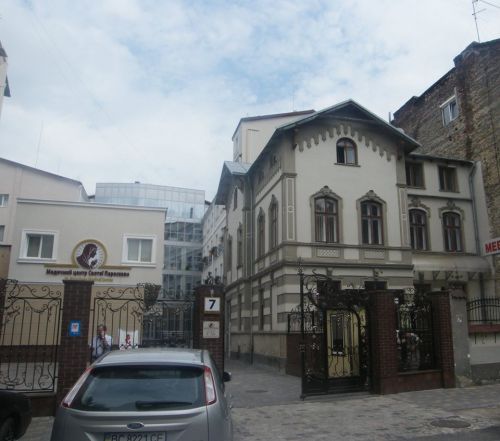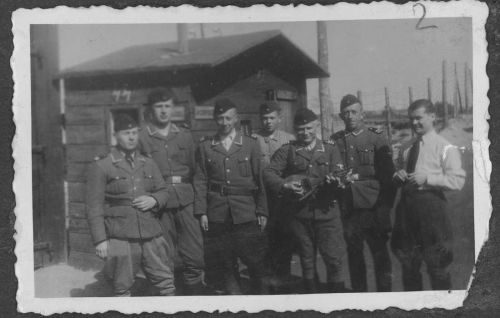Rudof Reder
Deportation from Lemberg to Belzec

Rudolf Reder's Former Factory at ul. Panienska 7 in Lvov (Belzec Museum)
On August 10, 1942, Rudolf Reder who was living in Lvov, then called Lemberg by the German occupation authorities was working in his workshop when members of the Gestapo broke the door down and took him away. In his own account Rudolf Reder describes the deportation journey and his arrival at the German death camp in Belzec:
I was in my workshop, I was working but had no stamp, so I locked the door and didn't answer even though I heard them finishing people off. The Gestapo broke the door down, found me in some hiding place, beat me over the head with a whip, and took me away. They packed us all into streetcars too tight for us to move or breathe and took us to the Janowska Camp.
It was already evening. They gathered us in a closed circle on a big meadow; there were six thousand of us. We were ordered to sit down and forbidden to stand, to move, or to stretch out an arm or a leg. A spotlight played on us from a tower; it was bright as day. Surrounded by armed thugs, we sat crowded incredibly close, all together, young and old, women and children of various ages. Several accurate shots rang out; someone had stood up; maybe he had wanted to be shot.
We sat that way all night. There was deadly silence. Neither the children nor the women cried. At six in the morning they ordered us to get up off the damp grass and form up in fours, and the long rows of the doomed marched to the Kleparow station. Gestapo and Ukrainians surrounded us in tight ranks. Not a single person could escape. They herded us onto the ramp at the station. A long freight train was already waiting just past the ramp. There were fifty cars. They began loading us. The doors of the freight cars had been slid open and Gestapo stood on both sides, two on each side with whips in their hands, beating everyone on the face and head on the way in. All the Gestapo were beating people. We all got welts on our faces and bumps on our heads. The women were sobbing and the children were crying, hugging to their mothers. There were women with babies at the breast among us. Driven by the Gestapo who kept beating people ruthlessly, we stumbled over each other.
The entrance was high, people had to climb up, pushing each other aside - we were in a hurry ourselves, we wanted to get it over with. A Gestapo man with a machine gun sat on the roof of each wagon. The Gestapo men were beating people and counting off a hundred into each wagon. It all happened so fast that it took no longer than an hour to load several thousand people. In our transport there were many men, including employed ones with various kinds of work certificates, supposedly 'safe ones,' little children and bigger ones, young girls and older women.
They finally sealed the cars. Packed into a crowd of trembling people, we stood tight, practically one on top of another. It was stuffy and hot and we were close to madness. Not a drop of water, not a crumb of bread. The train moved at eight in the morning. I knew that the stoker and engineer in the locomotive were Germans. The train moved quickly, but to us it seemed very slow. It stopped three times, in Kulikow, Zolkiew and Rawa Ruska. The stops were probably needed for the coordination of rail traffic. During the stops, the Gestapo came down from the car roofs and prevented anyone from approaching the train. They did not allow us even a drop of the water that people wanted to give, out of mercy, through the small grated window, to those fainting from thirst.
We rode on. No one said a word. We were aware that we were headed for death, that nothing could save us; apathetic, not a single moan. We were all thinking one thing: how to escape. But there was no way. The freight car we were riding in was brand new, the windows so narrow that I couldn't have squeezed through it. It must have been possible to pry the doors of other cars open, because we heard shots fired at escapees every few minutes. No one said anything to anybody, no one comforted the women lamenting, no one stopped the children from sobbing. We all knew: we were on our way to a certain and horrible death. We wished it was already over. Maybe someone escaped, I don't know...... Escape could be attempted only from the train.
About noon the train reached the Belzec station. It was a small station. Little houses stood around it. The Gestapo lived in these little houses. Belzec was on the Lublin - Tomaszow line , fifteen kilometers from Rawa Ruska. At the Belzec station the train reversed from the main line onto a spur that ran another kilometer, straight through the gate of the death camp. Ukrainian railroad workers also lived near the Belzec station, and there was a small post office. An old German with a thick black mustache got into the locomotive at Belzec - I do not know his name but I would recognise him in an instant; he looked like a hangman. He took command of the train and drove it right to the camp. It took two minutes to get to the camp. For the whole four months I would always see that same bandit. (His name was Rudolf Gockel).
The spur ran through fields. There was completely open space on both sides, not a single building. The German who had driven the train to the camp got down and 'helped.' Shouting and lashing out, he drove the people from the train. He himself went into each car and checked whether someone remained there. He knew all the tricks. When the train was empty and checked, he signaled with his flag and drove the train out of the camp.
The whole terrain between Belzec and the camp had been taken over by the SS. No one was allowed to show himself there. Civilians who wandered in by mistake were shot. The train pulled into a yard about a kilometer long and wide, surrounded by barbed wire and iron fencing, one atop the other, two meters high. The wire was not electrified. You drove into that yard through a wide, wooden gate topped with barbed wire. Next to the gate stood a hut where a sentry sat with a telephone. In front of the hut stood several SS men with dogs.

Belzec - Main gate and Sentry Hut (Regional Museum Tomaszow Lubelski)
When a train had passed through the gate, the sentry closed it and went inside the hut. That was when the 'taking delivery of the train' took place. Several dozen SS-men opened the cars, screaming 'los!' They drove people out of the cars with whips and rifle butts. The cars had doors a meter above the ground, and all those being herded out, young and old, had to jump to the ground. Children hurt themselves, everyone fell, dirty, exhausted and terrified. Aside from the SS, the so-called 'Zugsfuhrer's' were on duty. These were the supervisors of the permanent Jewish death crew in the camp, dressed normally without camp insignia.
The sick, the old and the small children, all the ones who could not walk on their own, were placed on stretchers and set down at the edge of enormous dug graves. Gestapo man Jirmann shot them there, and then pushed them into the grave with the rifle butt. This same Jirmann, a specialist in finishing off old people and small children, a tall Gestapo man, a handsome dark-haired man with a normal facial expression lived, like the others, in Belzec next to the station, in a little house, all by himself and, like the others, with no family or woman.
He appeared in the camp early in the morning, spent the whole day there, and took delivery of the death transports. As soon as the victims were unloaded, they were assembled in the yard, surrounded by armed askars and here Jirmann gave a speech. There was deathly silence. He stood close to the crowd. Everyone wanted to hear; hope dawned suddenly in us - 'If they are speaking to us, perhaps we are going to live, perhaps there will be some sort of work, perhaps after all.'
Jirmann spoke very loudly and distinctly: 'Ihr gehts jetzt baden, nachler werdet ihr zur Arbeit geschickt' (Now you are going for a bath, and afterwards you will be sent to work). That was all. Everybody cheered up and was happy that they were going to work after all. They applauded. I remember his words repeated day in and day out, usually three times a day, repeated for the four months I was there. It was a moment of hope and delusion. For an instant, the people breathed easy. There was total calm. The whole crowd moved on in silence, the men straight through the yard to a building on which it was written in large letters: 'Bade und Inhalationsraume' (Baths and Inhalation Room) The women went some twenty meters further to a large barracks, thirty meters by fifteen. The women and girls had their hair shaved off in that barracks. They entered not knowing why they had been led there. The calm and silence lasted a moment longer. Later on I saw that only a few minutes later, when they were given wooden stools and lined up across the barracks, when they were ordered to sit, and eight Jewish barbers, robots silent as the grave, approached them to shave their hair down to the scalp with clippers, the awareness of the whole truth hit them at that instant, and none of them and none of the men on the way to the chambers could have doubts any lomger
All of them, except for a few men selected as essential skilled workers, all of them were going to certain death. Little girls with long hair were herded in to be shaved, while the smallest girls with scant hair accompanied the men straight into the chambers. Suddenly, without any transition between the hope and the ultimate despair, there were laments and shrieks. Many women had fits of madness. Yet many other women went to their deaths coolly, especially the young girls. Our transport contained thousands of intellectuals and white-collar workers, many young men, but, as in all the subsequent transports - there was a majority of women.
I stood off to the side, in the yard, together with the group picked out to dig graves, watching my brothers, sisters, acquaintances and friends being driven to their death. While the women were being herded forward naked and shaved, whipped like cattle to the slaughter, without being counted, faster, faster - the men had already died in the chambers. It took more or less two hours to shave the women, which is also how long it took to prepare for the murder and the murder itself.
Source,
Rudolf Reder, Belzec, Panstwowe Muzeum Oswiecim-Brzezinka, Krakow, 1999
Belzec Museum
Regional Museum Tomaszow Lubelski
Thanks to Robert Kuwalek
© Holocaust Historical Society April 10, 2020

